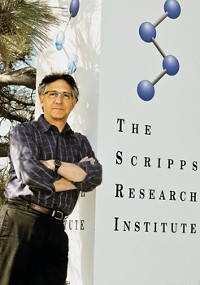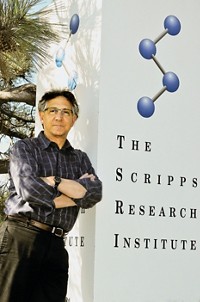Advertisement
Grab your lab coat. Let's get started
Welcome!
Welcome!
Create an account below to get 6 C&EN articles per month, receive newsletters and more - all free.
It seems this is your first time logging in online. Please enter the following information to continue.
As an ACS member you automatically get access to this site. All we need is few more details to create your reading experience.
Not you? Sign in with a different account.
Not you? Sign in with a different account.
ERROR 1
ERROR 1
ERROR 2
ERROR 2
ERROR 2
ERROR 2
ERROR 2
Password and Confirm password must match.
If you have an ACS member number, please enter it here so we can link this account to your membership. (optional)
ERROR 2
ACS values your privacy. By submitting your information, you are gaining access to C&EN and subscribing to our weekly newsletter. We use the information you provide to make your reading experience better, and we will never sell your data to third party members.
Analytical Chemistry
Scripps’ Leader Michael Marletta Resigns
Change at top comes after faculty opposed talks of merger with USC
by Elizabeth K. Wilson
July 22, 2014

Scripps Research Institute President and CEO Michael A. Marletta has resigned from the institute after a heated conflict with the faculty over a proposed merger with the University of Southern California.
Scripps announced on June 13 that it had begun talking with USC about a possible alliance that might inject needed funding into the financially shaky institute.
Scripps faculty vigorously opposed the partnership, saying in a June 20 e-mail to Marletta and Scripps Board of Trustees Chair Richard A. Gephardt that such a merger “would destroy much of what has been built.”
The Scripps faculty then cast a nearly unanimous formal vote of no confidence in Marletta and called for his resignation. On July 9, Scripps and USC announced they had terminated merger talks (C&EN, July 14, 2014, page 6).
Marletta, who is a member of C&EN’s advisory board, has led Scripps since January 2012. In a July 22 statement confirming Marletta’s resignation, Gephardt noted that the board “is working with Dr. Marletta on a possible transition plan.”
Gephardt added that the board will “work to make any transition to new leadership the highest priority” and “will engage all key constituencies in a dialogue about the future direction of this storied institution.”
Scripps chemistry professor Donna G. Blackmond tells C&EN that she and other faculty members “continue to have faith in both the mission and the future of Scripps as an independent research organization, one that holds promise for tremendous advances in the fields of biomedical science.
Blackmond added, “The faculty are committed to working in concert with the board and the administration for the greater good of the institution to make this vision a reality.”
Scripps projects a $21 million deficit for the current fiscal year ending Sept. 30. Much of Scripps’s funding comes from the National Institutes of Health, which has experienced increased competition for the grant money it distributes, especially as the agency’s budget has stagnated in recent years.





Join the conversation
Contact the reporter
Submit a Letter to the Editor for publication
Engage with us on Twitter